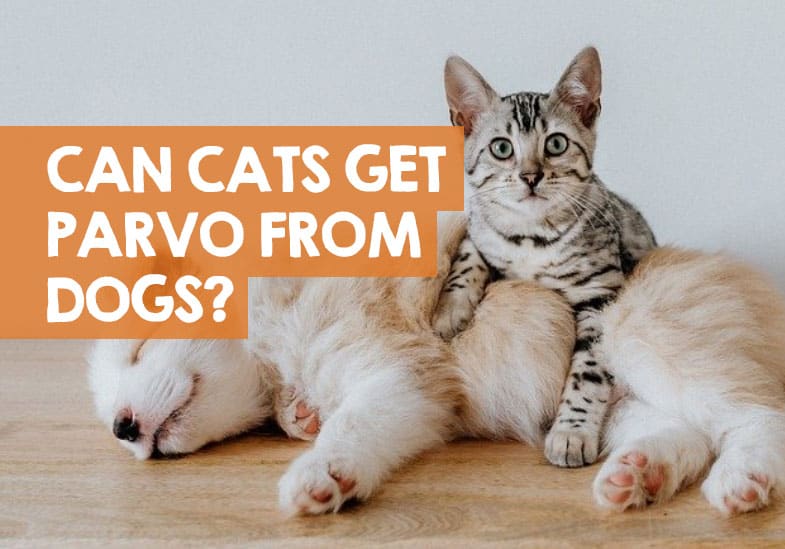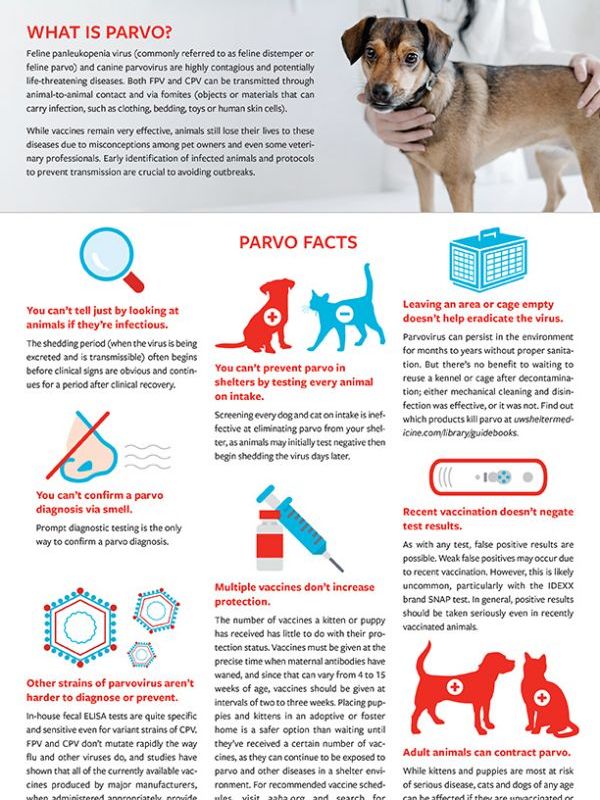Parvo Risk to Cats
Puppies adolescent dogs and adult dogs who are not vaccinated are at risk of contracting the virus. Its a small virus that first appeared in the 1970s.

Pin On Pet Health Pins By Harvey Animal Hospital
Cats with parvo oftentimes have violent and uncomfortable diarrhea.

. Cat parvo is an extremely contagious virus that has no cure. We will not be talking much about cat parvo panleukopenia that is specific to cats and well prevented with the proper vaccination. Parvo in puppies is unfortunately a common disease with deadly consequences which is why it is important.
They may show signs of. This is most likely because the cat remains in an environment where re-infection keeps occurring. Canine parvovirus commonly called parvo is a highly contagious viral disease that can produce a life-threatening illness in puppies and dogs.
Also dogs and cats cannot get parvovirus B19 from an infected person. ANY vomiting puppy should be tested for Parvo. Widespread vaccinations against this virus is why parvovirus today is an occasional risk instead of a constant plague.
In the case of parvo diarrhea is oftentimes yellowish in color and may be tinged with blood. When white cells are few in number the consequence is often serious. The risk reduces as a dog gets older.
It can be transmitted by any person animal or object that comes in contact with an infected dogs feces. There is a slight risk for unvaccinated cats to catch parvo from dogs but it is rare and unlikely even if your cat is unvaccinated. Their vomit and stool could contain blood.
Contact your veterinarian with your concerns. Cat parvo is an illness that is caused by the feline panleukopenia virus FPV aka feline parvovirus. Eventually it will stop feeding and drinking water.
This may occur one time or it is more likely to occur most times your cat goes to evacuate his bowels. Its transmitted from dog to dog through feces and vomit. An interesting and frankly somewhat scary report in an upcoming issue of Veterinary Microbiology Clegg et al 2012 provides further information suggesting that cats might be a source of canine parvovirus infection.
Symptoms range from fever severe dehydration diarrhea and vomiting. Its a small single-stranded DNA virus in case youre into virology and want to know how it replicates. Parvo shedding can be a risk to other cats and maybe dogs so these cats should be isolated if possible until the shedding has stopped.
The virus also travels to the lymph nodes. Can a puppy get parvo from a cat. Feline Parvovirus is spread among cats and cannot be spread to dogs.
It can prevent most dogs from catching parvo at all and dogs that do catch it will have milder cases. Its not uncommon for cats with parvo to begin to vomit regularly as well. As cats and dogs are different and distinct species there are many illnesses that will not spread between them.
Pets can be vaccinated to protect them from parvovirus infection. This virus is found in the air in the environment. Yes parvo in cats is transmissible to other unvaccinated cats.
If your dog or puppy is diagnosed with Parvo its best to consult with your vet about protection for your cat. These do not infect people but can affect other animals. Adult dogs that are current on vaccinations vaccinated within the last 12 months are at low risk for developing a clinical case of parvo.
Symptoms of Parvo in Cats include. This is a warning sign to get urgent veterinary care. Cat parvo otherwise known as panleukopaenia is caused by feline parvovirus.
This is a highly contagious disease and its also very dangerous. It is important to vaccinate your cat against this. Parvovirus is extremely contagious.
The symptoms of early-stage parvo in cats are fever diarrhoea and vomiting. They can however develop a mild illness and shed the virus thus it is recommended to get a booster vaccination if it has been 6 months or longer since the last booster. Some cats can continue to test positive for parvo for an unknown period after treatment.
Parvo Risk To Cats It is vital that if your cat contracts parvo you get it treated right away before the situation turns critical. Its symptoms include vomiting diarrhea lethargy fever and no appetite. If your cat gets parvo mortality rates are high but prompt veterinary care.
How to diagnose and treat parvo in cats is rather simple with lab tests and antibiotics but you must act quickly. Since parvovirus B19 only infects humans a person cannot get the virus from a dog or cat. Cats with parvo eventually develop Feline Infectious Enteritis FIE an infection of the bowels intestines.
On the other hand Canine Parvovirus is spread among dogs and can in fact be spread to cats. By Scott Weese on March 13 2012. However this is a rare phenomenon and does not happen in most cases.
The most common strain of feline parvovirus is feline panleukopenia FPV which was always assumed to be the cat version of the canine parvovirus. Because bone marrow is where white blood cells are produced your pets defense against disease suffers. Feline parvovirus is the virus that causes feline panleukopenia.
However as research has continued and more strains of the virus have developed scientists have found that cats can catch the same canine parvo from dogs. As long as your cat is an indoor cat there is no risk of them spreading parvovirus to your dog. Cats get feline distemper via the parvovirus.
Excessive sneezing Discharge from eyes Fever Loss of balance Difficulty walking Sudden diarrhea or vomiting Lethargy Refusal to eat. Both viruses attack cells within the pets bone marrow. Its not worth taking the chance however because on rare occasions it has happened.
Parvovirus is a highly contagious disease that is common among dogs and cats. A vaccine is available to prevent feline parvo. FPV is the leading cause of cat parvo.
Once it enters the host it infects cells that are rapidly dividing eg gut cells bone marrow cells fetal cells neonatal nerve and eye cells. It is also known as feline infectious enteritis cat fever or feline ataxia. Pet dogs and cats can get infected with other parvoviruses that do not infect humans.
This means that at some point in their lives all cats will be exposed to it. This potentially fatal infection which typically affects young unvaccinated or. Other sites call this feline distemper or feline infectious enteritis The feline panleukopenia and the canine parvovirus CPV belong to the Carnivore Protoparvovirus species.
First if your dog is old enough make sure they get their parvovirus vaccine series. Parvo Is Short for Parvovirus. Puppies are at the greatest risk for getting Parvo.
The last thing any new puppy owner or dog breeder wants to hear is a diagnosis of parvo. No your puppy will not get parvovirus from a cat.

Fact Sheet Debunking Parvo Myths Humanepro By The Humane Society Of The United States
Feline Parvovirus Infection Recognition Treatment And Prevention In The Shelter International Cat Care
Comments
Post a Comment